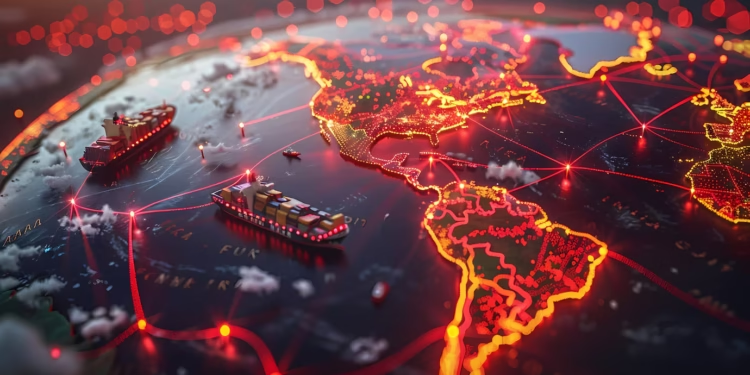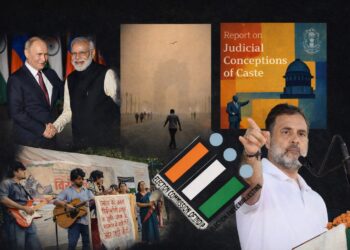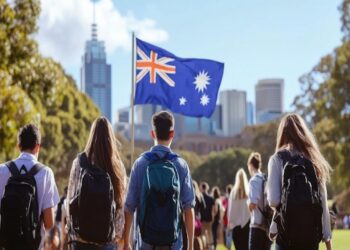The world is in the midst of a significant shift in global trade dynamics. With the return of aggressive tariff regimes—led most recently by the United States under President Donald Trump—the future of free trade is under growing pressure. Against this backdrop, India’s traditionally cautious approach to trade, often criticised for being overly protective, is now being viewed in a new light.
Could the very trade scepticism that kept India out of several global pacts now become its shield in a tariff-heavy world?
A Global Slowdown Driven by Tariffs
In April 2025, the Trump administration unveiled sweeping tariff hikes that shook international markets. A baseline 10% tariff on all imports was announced, with additional duties on specific nations and products. In effect, the U.S.’s average trade-weighted tariff rate skyrocketed from 2% to 24%—the highest since the early 20th century.
India, though not among the most targeted countries, was hit with a 26% tariff on its exports to the U.S., one of its largest trading partners. Products from sectors such as pharmaceuticals, textiles, gems and jewellery, and machinery now face steep price increases in the American market.
Globally, this sudden shift in trade policy has prompted fears of retaliation and protectionist domino effects. Many economies that previously relied on export-led growth models are finding themselves cornered.
India’s Trade Conservatism: A Liability or an Unexpected Asset?
India’s trade policy has long been marked by strategic protectionism. The country has maintained higher average tariffs than most major economies, shielding domestic industries and encouraging self-reliance. This stance often kept India out of high-profile multilateral trade agreements like the Regional Comprehensive Economic Partnership (RCEP) and contributed to criticism from more open economies.
However, in the context of rising global protectionism, India’s caution seems prescient. Unlike countries that deeply integrated into global supply chains and built economies heavily dependent on exports, India’s growth has been largely consumption-driven. The share of exports in India’s GDP is lower than that of countries like Vietnam, Malaysia, or even China.
This means that the impact of global tariff wars may be comparatively muted for India. While its exporters will face challenges, the domestic economy has a broader base to rely on, offering some insulation from international volatility.
India’s Response: Negotiation Over Retaliation
Notably, India has chosen not to escalate the trade dispute with the U.S. through retaliatory tariffs. Instead, the government is pursuing diplomatic negotiations, aiming to conclude a bilateral trade agreement with the U.S. by autumn 2025.
According to sources familiar with the discussions, the Indian government views the current crisis as an opportunity to reset and strengthen trade relations with the U.S. and other partners. By taking a non-combative stance, India hopes to safeguard its long-term interests and avoid a spiral of punitive measures.
This approach stands in contrast to countries like China or the EU, where reciprocal tariffs and public criticism have escalated tensions. India’s measured diplomacy has earned it praise for prioritising stability over short-term political gains.

Economic Risks Remain
Despite the strategic prudence, the tariff hikes are not without consequences. India’s export sectors—especially labour-intensive ones like garments, handicrafts, and jewellery—face steep losses. According to estimates from industry groups, India could lose billions in annual export revenues, particularly if U.S. demand declines or if Indian products are priced out due to additional duties.
Global rating agency Moody’s Analytics has already revised India’s GDP growth forecast for FY2025, reducing it by 30 basis points due to trade-related uncertainty. Although the fundamentals of the Indian economy remain strong, the squeeze on exporters, potential job losses, and ripple effects on investor sentiment cannot be ignored.
RBI Intervenes to Support Growth
To cushion the impact, the Reserve Bank of India (RBI) acted quickly. In April 2025, it cut the repo rate by 25 basis points to 6.00%, while shifting its stance to “accommodative”. This marks the second rate cut in a year and is intended to boost domestic demand and credit flow to support economic momentum.
The RBI Governor noted that the central bank remains “prepared to act further” if external headwinds persist. By easing monetary policy, India is signalling its intent to focus on internal economic resilience, even as the global trade outlook remains uncertain.
Will the Strategy Pay Off?
Several factors suggest that India could gain a relative edge if it plays its cards right:
- Self-Reliance Framework: Under the government’s Atmanirbhar Bharat (self-reliant India) campaign, manufacturing and supply chain localisation have already gained traction. This could lessen dependence on volatile global imports and exports.
- Investor Diversion from China: With companies increasingly wary of political risk and tariffs in China, India stands as a potential alternative for manufacturing investment. If the government can ease regulations and improve logistics, it could attract a share of the “China+1” strategy.
- Focus on Regional Trade: India has been recalibrating its trade outreach to focus more on bilateral and regional partnerships, including those with the Gulf, Africa, and Southeast Asia—markets that are less exposed to U.S.-China tariff tensions.
- Stable Domestic Demand: With over 1.4 billion people, India’s domestic market remains a huge driver of economic activity. Even as exports face challenges, consumer demand and infrastructure investments can continue to power GDP growth.
A Cautious Optimism
That said, much will depend on how effectively India can leverage its current stance. Protectionism without productivity can stifle innovation. If trade barriers are used merely to shelter inefficiency, the long-term outcome may not be favourable.
The key lies in using this buffer to invest in competitiveness, ease regulatory bottlenecks, and create a business ecosystem that welcomes global investment without being over-reliant on any single trade partner.
Final Thoughts
The world may be entering a new phase of economic nationalism, and the global free trade order is being tested. India, often seen as a reluctant globaliser, might now find its caution to be a strategic advantage.
By resisting knee-jerk retaliation, doubling down on internal reforms, and quietly strengthening its diplomatic and economic toolkit, India has the potential to emerge as a steady, reliable player in an otherwise turbulent global economy.
In an age of tariff wars, being a trade-shy economy may not be a weakness after all—it could be a rare strength.











